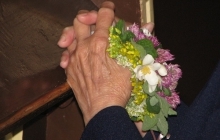Not to become enslaved to anything and live like a lotus leaf in the waters of life without being touched or polluted by it -- is the quality of a true vairagi. In the Bhagwad Gita, Krishna offers a practical formula to gain control of the mind. He tells Arjuna that one can control the restless mind with abhyasa or practice and vairagya or dispassion.
The virtue of vairagya or detachment is extolled and advocated by a number of major religions and ancient philosophies including Hinduism, Buddhism and Jainism. ‘One who performs his duty without attachment surrendering the results unto the Supreme, is unaffected by sinful action as the lotus is untouched by water’ says the Gita. Detachment is one of the supreme ideals of Jainism together with non-violence, non-possession, non-attachment and it is among the five great vows Jain monks observe. It is also a central concept of Zen Buddhist philosophy. The upanishads say, ‘Let us leave attachment and possessiveness and still enjoy whatever is presented to us’. In vedanta, vairagya is an important virtue; a fundamental and dedicated practice. All other virtues follow.
Vairagya is dispassion, detachment, or renunciation from material objects; It does not mean giving up or developing repulsion for material objects. True vairagya is an internal state of mind rather than external lifestyle. It can be practised equally well by one engaged in household affairs or by a renunciate. You can maintain a balance between your inner spiritual state and your external life through the practice of seeing each entity as an expression of the one cosmic Consciousness or Brahmn.
All attachments cause suffering. A true vairagi is not interested in the illusory world of maya -- it is love that keeps him here; love to him means kindness, service, forgiveness and helpfulness without expectation. As he advances on the path of vairagya, he becomes more loving -- though he may not express his love outwardly because much of his life is lived inwardly.
Vairagya is born of viveka or discrimination between the eternal and non-eternal. Intense vairagya leads to moksha. Vairagya can be cultivated if we consider ourselves as trustees and not owners. Swami Sivananda gives a step-by-step approach to vairagya.
In the first stage, an attempt is made to not allow the mind to run into sensual channels. In the second stage, you train your mind to overcome attraction and attachment for objects that lure you; you gradually develop vairagya. In the next stage, your senses remain still but the mind has neither raga (like) nor dvesha (dislike) for objects, acting independently.
In the fourth stage, objects no longer tempt you and your mind is free from likes and dislikes -- you get established in vairagya. Without vairagya, spiritual progress is not possible.
After gaining control of the mind and having shed kama, krodha, and ahankara in this way, one can even attain Self-realisation, says the Gita. Vairagya, thus, is a doorway to Self-realisation.
Lebanese poet-philosopher Kahlil Gibran, in ‘The Prophet’ has beautiful advice to offer with reference to detachment in relationships: “Let there be spaces in your togetherness, and let the winds of the heavens dance between you. Love one another but make not a bond of love. Let it rather be a moving sea between the shores of your soul. Sing and dance together but let each one be alone. Stand together yet not too near together, for the pillars of a temple stand apart and the oak tree and cypress grow not in each other’s shadow.”






